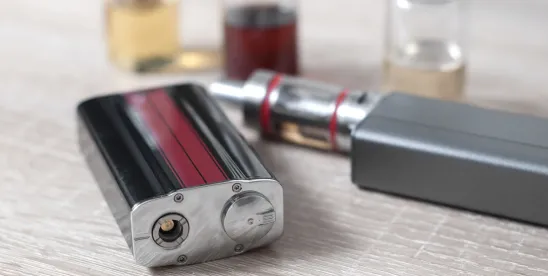On October 16, 2024, the Oregon Court of Appeals in Bates v. Oregon Health Authority made a significant ruling by overturning a law restricting the packaging of e-cigarette and cannabis products on the grounds that the law is an unconstitutional restriction on free speech.
The law in question, ORS. 431A.175(2)(f), prohibited an “inhalant delivery system” [1] from being packaged “in a manner that is attractive to minors.” Subsequently, the Oregon Health Authority promulgated OAR 333-015-0357, which provided further elaboration on what is considered “attractive” to minors in product packaging by banning the use of:
- Cartoons;
- Celebrities, athletes, mascots, fictitious characters played by people, or other people likely to appeal to minors;
- Food or beverages likely to appeal to minors, such as candy, desserts, soda, food or beverages with sweet flavors including fruit or alcohol;
- Terms or descriptive words for flavors that are likely to appeal to minors, such as tart, tangy, sweet, cool, fire, ice, lit, spiked, Poppin’, juicy, candy, desserts, soda, sweet flavors, including fruit, or alcohol flavors; or
- The shape of any animal, commercially recognizable toy, sports equipment, or commercially recognizable candy.
In addition to this comprehensive list of items explicitly prohibited from packaging, the rule includes a general catch-all restriction to include any presentation, shape, graphic, coloring, or writing that is likely to appeal to minors.
Plaintiffs Paul Bates and No Moke Daddy LLC (doing business as Division Vapor) argued that the packaging restrictions were overly broad and unconstitutionally vague and infringed on their right to free speech by prohibiting truthful, non-misleading communication. The Circuit Court denied the state constitutional challenge and dismissed the action. On appeal, the Oregon Court of Appeals reversed and remanded on grounds that the law violates free speech as outlined in Article I, Section VIII of the Oregon Constitution.
The Court of Appeals explained that selling products is a form of communicative behavior that may involve protected speech. The Court stated that while there is nothing inherently expressive about packaging on its own, the law restricting “attractive” packaging is reasonably interpreted to refer to the communicative aspects of the packaging and not its functionality. Thus, the packaging restrictions are a direct restriction on expressive speech. In particular, the Court noted that the law is not based on the effect of the packaging (i.e., whether any children actually purchase the product as a result of the packaging), but rather turns on the substance of the expressive content.
In addition to this law, the vapor industry in Oregon is already subject to a wide variety of packaging requirements, including warning labels and child-resistant safety packaging for liquid nicotine containers.
[1] “Inhalant Delivery System” is defined as “a device that can be used to deliver nicotine or cannabinoids in the form of a vapor or aerosol to a person inhaling from the device”; or “A component of a device described in this subparagraph or a substance in any form sold for the purpose of being vaporized or aerosolized by a device described in this subparagraph, whether the component or substance is sold separately or is not sold separately.” See ORS 431A.175(1)(a)(A).




 />i
/>i

